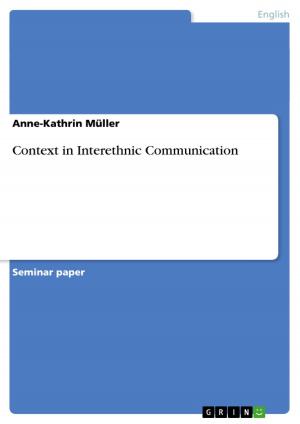Multilingualism within Nation States and the Danger of Separation
Nonfiction, Social & Cultural Studies, Political Science| Author: | Gordon Wagner | ISBN: | 9783640911486 |
| Publisher: | GRIN Publishing | Publication: | May 9, 2011 |
| Imprint: | GRIN Publishing | Language: | English |
| Author: | Gordon Wagner |
| ISBN: | 9783640911486 |
| Publisher: | GRIN Publishing |
| Publication: | May 9, 2011 |
| Imprint: | GRIN Publishing |
| Language: | English |
Seminar paper from the year 2011 in the subject Politics - International Politics - Topic: European Union, grade: 1,0, European University Viadrina Frankfurt (Oder), course: Language and Identity, language: English, abstract: Worldwide, there are almost 6,800 languages in 228 countries and approximately 200 languages that have more than one million native speakers. There are even less official nation states existing, according to various sources between 192 and 195. Obviously, not every single country or nation state exclusively contains citizens speaking only one language and we don't need to seek out long, but instead take a look to member states of the European Union (EU) as there are countries like Belgium, Luxembourg and Ireland that are officially tri- and/or bilingual. On one hand, this suggests the existence of a considerately strong movement of native speakers among the respective country's citizens that are not willing to accept merely one mother language (as is the case in Ireland, where both Irish and English are officially recognized idioms). On the other hand, it might indicate the existence of a potential language conflict situation - and indeed there are multilingual nation states in which this proves to be the case. There are many such examples throughout the world, e.g. Belgium, Spain and its various autonomous communities) or the Canadian province Québec. In fact, established nation states are threatened to break in part due to their citizens speaking utterly different languages and instead of just one with varying accents and/or dialects. So how do countries deal with these issues? What are the possible consequences of using more than one official language among an established nation state and how might this shape the citizens' perception and consciousness on a wider range?
Seminar paper from the year 2011 in the subject Politics - International Politics - Topic: European Union, grade: 1,0, European University Viadrina Frankfurt (Oder), course: Language and Identity, language: English, abstract: Worldwide, there are almost 6,800 languages in 228 countries and approximately 200 languages that have more than one million native speakers. There are even less official nation states existing, according to various sources between 192 and 195. Obviously, not every single country or nation state exclusively contains citizens speaking only one language and we don't need to seek out long, but instead take a look to member states of the European Union (EU) as there are countries like Belgium, Luxembourg and Ireland that are officially tri- and/or bilingual. On one hand, this suggests the existence of a considerately strong movement of native speakers among the respective country's citizens that are not willing to accept merely one mother language (as is the case in Ireland, where both Irish and English are officially recognized idioms). On the other hand, it might indicate the existence of a potential language conflict situation - and indeed there are multilingual nation states in which this proves to be the case. There are many such examples throughout the world, e.g. Belgium, Spain and its various autonomous communities) or the Canadian province Québec. In fact, established nation states are threatened to break in part due to their citizens speaking utterly different languages and instead of just one with varying accents and/or dialects. So how do countries deal with these issues? What are the possible consequences of using more than one official language among an established nation state and how might this shape the citizens' perception and consciousness on a wider range?















